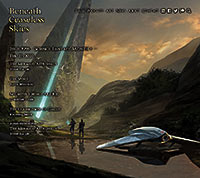Faren Miller reviews John Shirley
 With a title taken from a Bob Dylan song and epigraphs from The Bhagavad Gita, John Shirley’s Everything Is Broken might seem like a natural for his own stomping ground, the San Francisco Bay Area. One young character, who spent the last two years ‘‘vaguely majoring in English’’ back in Akron OH while living with his mom, could have been drawn toward Berkeley. But Russ accepts an invitation from his dad, lured by the promise of a job in the tiny burg of Freedom, California. In this book’s dire near-future, such hopes will swiftly vanish.
With a title taken from a Bob Dylan song and epigraphs from The Bhagavad Gita, John Shirley’s Everything Is Broken might seem like a natural for his own stomping ground, the San Francisco Bay Area. One young character, who spent the last two years ‘‘vaguely majoring in English’’ back in Akron OH while living with his mom, could have been drawn toward Berkeley. But Russ accepts an invitation from his dad, lured by the promise of a job in the tiny burg of Freedom, California. In this book’s dire near-future, such hopes will swiftly vanish.
Even before a massive tsunami nearly levels this (invented) town on the northern coast, the Prologue sounds a warning with its opening rant: ‘‘My name is Dickie Rockwell and I fucking rule Freedom, California!’’ Like some foulmouthed version of a mad king from the pen of Shakespeare, Dickie’s screams may be addressed less to his scraggly band of followers than to his perceived equal and rival, ‘‘the cold October sea.’’ And yet, not long after the murder of one man which ends this scene, the ocean strikes with a ferocity that slaughters thousands.
Freedom is woefully unprepared for disaster. Lou Ferrara, the bar owner and mayor who gave it that name to trumpet his own (radically anti-government) philosophy, has ditched the fire department, slashed the police force down to almost nothing, and considers any offers of help from the outside world as signs of foul conspiracy against him. Mingling Tea-Party paranoia with the hubris of a Mafia don, Lou can resemble a comedic take on the Far Right – though both he and fellow villain Dickie reveal enough dark baggage, in the course of the tale, to become almost tragic.
The tsunami doesn’t just provide excuses for political satire. Shirley dives headlong into disaster- epic mode: fast-paced, brutal, heavily-armed and compulsively readable. As the viewpoint ranges among his cast (aside from Russ as the naive outsider, there’s a slacker, an aging hippie, a hapless Goth girl raised by fundamentalists, several oddballs who may be solid citizens at heart, and more than one kind of nutcase), each brings a personal slant to the desolation around them. Is it the end of the world called down by an enraged Jehovah, the perfect opportunity for massive self-indulgence amid the last scraps of the good life, confirmation that the System sucks, or a trial that might have positive results if one can only summon the inner strength to do what must be done? All this and more.
Even for the lucky or determined ones who manage to survive both nature and their fellow man, things can still get worse. One rather ditsy female describes their current situation in terms of ‘‘scary movies’’:
See, the story wouldn’t be any good if it just started with the monster killing everyone, you got to set them up. I mean, in some movies they give you a sample killing out in front but not for the hero. And that’s what the world is. The world starts out pretty okay for most people, and then they get sick or beat up or tortured or else just trapped somewhere and… die all disappointed.
She concludes dismally, ‘‘the part where things are good is gone for us, … and now we’re in the killing and killing part that the demons like.’’
Everything Is Broken combines that formula (complete with an initial ‘‘sample killing’’), with displays of the more upbeat, macho attitude where evil can be vanquished – as long as some scared newbie finally manages to pull the trigger. Both responses seem thoroughly American. But the book’s coda comes from one of Conan Doyle’s tales of quintessentially English sleuth Sherlock Holmes, as he ponders life’s ‘‘circle of misery and violence and fear.’’ There must be some sense to it, ‘‘or else our universe is ruled by chance, which is unthinkable.’’
The great solver of mysteries can only conclude, ‘‘There is the great standing perennial problem to which human reason is as far from an answer as ever.’’ After another century of horrors old and new, the challenge lingers.







